Hindon Yatra Delhi Workshop
Impact Driven Partnerships for Ganga Tributary Rejuvenation
Replicating and scaling up success stories from the participatory Hindon Basin approach
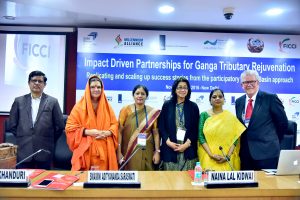
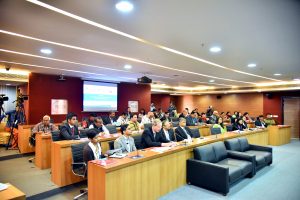
The 2030 Water Resources Group, India Water Partnership, FICCI, Jal Jan Jodo Abhiyan, Millennium Alliance and the Government of Netherlands organized a symposium and exhibition on ‘Impact Driven Partnerships for Ganga Tributary Rejuvenation – Replicating and scaling up success stories from the participatory Hindon Basin approach’ in Delhi on 23 November 2016. The workshop brought together 75 water experts from different tributaries of the Ganga basin, including Hindon, Ramganga and Yamuna. Participants included NGOs, industries, research organizations, donors, state and central government representatives including Mr. UP Singh, Director General, National Mission for Clean Ganga.
“The symposium showcased multi-stakeholder approaches to rejuvenate part of the Ganga River Basin based on a tributary approach, with a particular focus on the Hindon River in Uttar Pradesh, one of the most polluting tributaries of the Ganga”, said Mr Anders Berntell, Executive Director, 2030 Water Resources Group (2030 WRG).
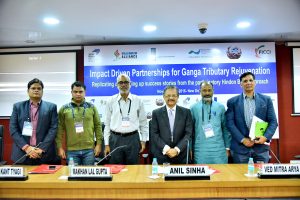
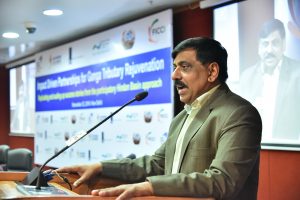
The Hindon River Rejuvenation Partnership is a transformational program with significant community involvement. The partnership is working with the divisional administration, local industry representatives, and civil society; encouraging stakeholders to collectively identify opportunities and solutions to water challenges. The Hindon basin has a population of about 10 million people. The program was initiated in 2015 by a civil society movement led by Jal Jan Jodo Abhiyan under the leadership of Rajendra Singh, Stockholm Water Prize Laureate. Several practitioners from across the Hindon basin traveled to Delhi to share their experiences, innovations and project ideas for river rejuvenation. These ranged from NGOs working on organic farming from seed to market, water literacy, river encroachment; to passionate government officials promoting the “make in Hindon’ brand and; technology companies wanting to test bioremediation solutions in small tributaries.
“The biggest achievement of the Hindon Yatra has been the stakeholder participation without any incentive to them. Over the course of the past year, 2030 WRG and India Water Partnership have documented best practices of local stakeholders across the seven districts of the Hindon Basin, developed a vision for its rejuvenation and gathered project proposals from NGOs, industries, universities, farmers and local authorities to jointly clean the river. Initial estimates indicate it will require a package of measures and resources in the urban, industrial, agricultural and environmental sectors to rejuvenate the river” said Dr Veena Khanduri, Executive Secretary, India Water Partnership.
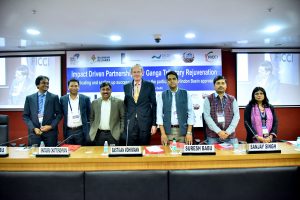
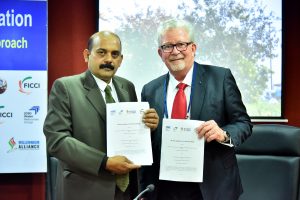
The 2030 WRG signed a memorandum of understanding with the Millennium Alliance (MA) to catalyze seed funding for projects. The MA is a national platform supported by donors and private partners to identify, test, award and scale innovations which bring improvements at the Bottom of the Pyramid (BOP). As a first step in this bold journey, Mr Nirankar Saxena, Senior Director, FICCI and MA Head said, “we are proud to announce that the Millennium Alliance will provide seed funding for innovative businesses with social and environmental impact for the Hindon and other river basins under a targeted call for River Rejuvenation as part of our Water & Sanitation focus area.”
“FICCI, along with partners, is playing a critical role in mobilizing global and local expertise to address industrial and municipal waste water treatment, critical to addressing India’s water and sanitation challenges today. I hope we all will sow a million seeds with the participatory multi-stakeholder approach among those who are coming forward” said Ms Naina Lal Kidwai, Chairman, FICCI Water Mission.
Respected Swamini Adityananda Saraswati, Director Programmes, Policy and Development, Global Interfaith WASH Alliance, Ganga Action Parivar and National Ganga Rights Movement, Parmarth Niketan stressed on the ‘Tragedy of Commons’ related to the river issues and emphasized the need for collaboration. Dr. Bindu Dey, Secretary, Technology Development Board, Department of Science & Technology, Government of India laid emphasis on why we all should move from ‘I to We’. They both also highlighted the importance of defining the intervening pathways, sustainable behavioral change, capacity building and access to technology.
Efforts are underway, to mobilize additional resources from government, private sector and donors to help rejuvenate the river to reach a level suitable for bathing by 2030. It is hoped that this model will be replicated across other tributaries in the Ganga basin and beyond through multi-stakeholder partnerships and collective action.
